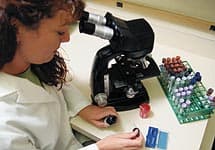Life Extension Magazine®
Flax (Linum usitatissimum) has been with us since the dawn of civilization. The mummies of ancient Egypt, cocooned in layers of linen woven from flax, attest to the crop’s early importance. Archeology reveals that flax was cultivated in ancient Babylonia and prehistoric Europe at least 5,000 years ago, and flax linen is mentioned repeatedly in the Bible’s Old Testament. Later, the citizens of ancient Rome draped themselves in flax linen, while consuming flaxseed specifically to improve their intestinal health. As it turns out, the Romans were on to something. Flaxseed is good for intestinal health, owing to its excellent dietary fiber profile.1 As one researcher wrote recently, “[a diet] rich in fiber has a preventive effect against constipation, colon diverticulosis, [cancer] of the large bowel and stomach, type II diabetes, metabolic syndrome, and cardiovascular disease. In the case of constipation, diverticulosis, and diabetes, this effect solely depends on dietary fiber.”2 As healthful gifts from nature go, there is far more to flaxseed than mere roughage. While ground flaxseed (also known as linseed) is an excellent source of soluble and insoluble dietary fibers, it is also a rich source of lignans. To be precise, flax is a source of concentrated lignan precursors. Abundant phytochemicals in flaxseed are converted into mammalian lignans in the body, through the activity of normal gut bacteria. In humans, flax lignans are largely converted into bioactive chemicals called enterolactone and enterodiol.3,4 Lignans are a class of hormone-like chemicals, or phyto-estrogens, believed to be responsible for health benefits that include protection against certain cancers, cardiovascular disease, and other conditions.5-12 Flaxseed is also a rich source of alpha-linolenic acid (ALA), one of the few plant sources of all-important omega-3 polyunsaturated fatty acids, essential nutrients that are associated with reduced inflammation, improved cardiovascular health, cancer prevention, and optimal brain function. In the body, ALA is converted to two more biologically active omega-3 fatty acids, EPA (eicosapentaenoic acid) and DHA (docosahexaenoic acid).1,13-16
Rich in PhytoestrogensFlaxseed is one of a handful of edible plants that contain compounds called phytoestrogens. Nonsteroidal biochemicals in certain plants with estrogen-like activity, phytoestrogens mimic estrogens in the human body. Two versions of estrogen receptors are located on a wide variety of tissues throughout the body and brain, in both sexes. Because they are able to bind with estrogen receptors and influence the metabolism of estrogens, phytoestrogens are thought to be largely responsible for the health benefits of soy and other phytoestrogen-rich foods, including flaxseed. These benefits include improved cardiovascular health, cancer prevention, decreased inflammation, protection of neurons from age-related decline, and improved bone health.17-21 In the body, phytoestrogens modulate cell-signaling activities, which may in turn affect the risk of developing certain cancers, including breast, endometrial, and colon cancers.19,22-26 One mechanism by which flaxseed may help cut the risk of certain cancers is by modifying the metabolism of estrogens in the body. Supplementation with flaxseed increases the ratio of estrogen metabolites 2-hydroxy-estrone to 16-alpha-hydroxy-estrone excreted in the urine.27 An increased ratio of 2-hydroxyestrone to 16-alpha-hydroxyestrone is associated with a reduced risk of estrogen-related cancers.28 Thwarting CancerResearchers in New York assessed breast cancer risk and dietary lignan intake in more than 3,000 women, including about 1,100 patients with confirmed breast cancer and approximately 2,000 cancer-free women who served as controls. Using statistical analyses, the scientists determined that premenopausal women with the highest lignan intake had a reduced risk of developing breast cancer.22 Last year, scientists in Italy reported similar findings. Their research indicates that higher blood levels of enterolactone—the primary lignan derived by the body from flaxseed—are associated with a lower risk of breast cancer. Conversely, the researchers noted, “values of serum enterolactone were significantly lower in women who subsequently developed breast cancer,” leading them to conclude that the phytoestrogen enterolactone “had a strong protective effect on breast cancer risk.”29
Lignans may also protect against endometrial cancer, a condition associated with prolonged exposure to unopposed estrogens. Flax lignans may offer protection through an anti-estrogenic effect in the body. Researchers in California assessed lignan intake and cancer status among nearly 1,000 women in the San Francisco area and determined that women with the highest dietary lignan intake experienced the lowest risk of developing this carcinoma of the uterine lining. The relationship between lignans and endometrial cancer risk was slightly stronger among postmenopausal women.23 Emerging evidence suggests that flaxseed may offer protection against colon cancer. In both short- and long-term animal studies, investigators examined the effects of flaxseed supplementation on an experimental model of colon cancer. They found that flaxseed offered a protective effect against the development of precancerous changes (polyps, microadenomas, and aberrant crypts and foci) of the colon.24,25 Moreover, laboratory studies indicate that the mammalian lignans enterolactone and enterodiol, which are derived from precursors in flaxseed, inhibit the growth of human colon tumor cells.26 Researchers thus believe that flaxseed shows promise in reducing risk for colon cancer. Preventing MetastasisFlaxseed may also help prevent the metastasis, or spread, of cancer cells. Scientists in Nebraska added flaxseed to the diets of mice that had been injected with melanoma (skin cancer) cells. They discovered a reduction in the cross-sectional area, volume, and metastasis (spread) of deadly melanoma tumors among flaxseed-fed mice. The more flaxseed the rodents consumed, the greater the reductions.30 Using a rodent model of human breast cancer, a University of Toronto research team demonstrated that supplementation of the animals’ diet with 10% flaxseed resulted in significantly reduced tumor growth and metastasis. Compared to control animals, mice receiving flaxseed experienced a 45% reduction in the spread of tumors to other sites. Tumors spread to the lymph nodes of only one third of flaxseed-fed mice, while a whopping 89% of mice receiving standard rations developed tumors of the lymph nodes.31 The research team also noted that levels of insulin-like growth factor I and epidermal growth factor receptor—both implicated in cancer progression—were also reduced in flaxseed-fed mice.31 In another study, the Toronto research team demonstrated that supplementing mice with established human breast tumors decreased extracellular levels of vascular endothelial growth factor, a substance required by tumors to maintain an adequate blood supply (angiogenesis). The researchers speculated that this might be one mechanism by which flaxseed supplementation decreases tumor growth and metastasis in rodents with a model of human breast cancer.10
Cardiovascular BenefitsFlaxseed offers multiple health benefits, including improved cardiovascular health. Researchers in the Netherlands examined dietary phytoestrogen intake and heart health among more than 300 postmenopausal women. The effects of dietary isoflavones, such as those found in soy, were compared with the effects of dietary lignans, such as those present in flaxseed. The researcher determined that while isoflavones had no significant effect on blood pressure, dietary lignans were associated with lower systolic and diastolic blood pressure values and a decreased prevalence of hypertension. Even low levels of dietary lignans exerted a protective effect on blood pressure.32 Their findings echo those of a Canadian team that studied how flaxseed supplementation affects blood pressure in postmenopausal women with vascular disease. After consuming a diet rich in flaxseed, the women were required to undergo a stressful mental challenge. The subjects’ blood pressure was monitored and results were interpreted in light of the women’s known atherosclerotic disease. Flaxseed significantly reduced blood pressure related to mental stress. “Flax phytoestrogens ameliorate certain responses to stress and thus may afford protection against atherosclerosis,” concluded the researchers. They noted that two components of flaxseed—alpha-linolenic acid, an omega-3 fatty acid, and lignan phytoestrogens—may play a dual role in this blood pressure-reducing effect.33 Back in the laboratory, scientists at Oklahoma State University examined how dietary flaxseed influences cholesterol levels and plaque formation in rodents. Some of the animals’ ovaries were removed, triggering a rise in cholesterol levels and formation of atherosclerotic plaques in blood vessels. The animals were further subdivided into groups that received various doses of flaxseed or replacement hormones. All doses of flax reduced cholesterol levels as effectively as the replacement hormones. The researchers concluded, “flaxseed is beneficial in reducing plasma cholesterol and plaque formation.”6
Improving Blood SugarMore than a decade ago, scientists at the University of Toronto showed that dietary flaxseed likewise reduces total cholesterol and LDL (low-density lipoprotein) in humans. Furthermore, they discovered, adding 50 grams of high-ALA flaxseed to the diet also reduces after-meal glucose levels.1 Controlling post-meal blood sugar response is considered desirable in helping prevent the onset of type II diabetes. Relieving Menopausal SymptomsAbout a decade later, scientists in Quebec reported similar findings. Menopausal women were assigned to receive either hormone replacement therapy or supplemental dietary crushed flaxseed. Various markers of health—including post-meal glucose and insulin levels, as well as total cholesterol—were examined. The researchers concluded, “40 [grams] of flaxseed is as effective as oral estrogen-progesterone to improve mild menopausal symptoms and to lower glucose and insulin levels.” This level of flaxseed consumption did not, however, result in a significant reduction in total cholesterol.34 ConclusionAdding flaxseed to the diet appears to be a simple yet effective means of improving overall health. Flaxseed’s combination of natural lignans, phytoestrogens, dietary fiber, and omega-3-fatty acids packs a powerful nutritional punch that may help to lower reduce cancer risk, optimize cardiovascular health, and relieve mild symptoms of menopause. Many health-conscious adults find ground flaxseed to be a tasty and nutritious addition to smoothies, hot cereal, salads, and steamed vegetables. | |||||
| References | |||||
| 1. Cunnane SC, Ganguli S, Menard C, Liede AC, Hamadeh MJ, Chen ZY. High alpha-linolenic acid flaxseed (Linum usitatissimum): some nutritional properties in humans. Br J Nutr. 1993 Mar;69(2):443-53. 2. Trepel F. Dietary fibre: more than a matter of dietetics. II. Preventative and therapeutic uses. Wien Klin Wochenschr. 2004 Aug 31;116(15-16):511-22. 3. Nesbitt PD, Lam Y, Thompson LU. Human metabolism of mammalian lignan precursors in raw and processed flaxseed. Am J Clin Nutr. 1999 Mar;69(3):549-55. 4. Jansen GH, Arts IC, Nielen MW, et al. Uptake and metabolism of enterolactone and enterodiol by human colon epithelial cells. Arch Biochem Biophys. 2005 Mar 1;435(1):74-82. 5. Donaldson MS. Nutrition and cancer: A review of the evidence for an anti-cancer diet. Nutr J. 2004 Oct 20;3(1):19. 6. Lucas EA, Lightfoot SA, Hammond LJ, et al. Flaxseed reduces plasma cholesterol and atherosclerotic lesion formation in ovariectomized Golden Syrian hamsters. Atherosclerosis. 2004 Apr;173(2):223-9. 7. Jenkins DJ, Kendall CW, Vidgen E, et al. Health aspects of partially defatted flaxseed, including effects on serum lipids, oxidative measures, and ex vivo androgen and progestin activity: a controlled crossover trial. Am J Clin Nutr. 1999 Mar;69(3):395-402. 8. Prasad K. Flaxseed: a source of hypocholesterolemic and antiatherogenic agents. Drug News Perspect. 2000 Mar;13(2):99-104. 9. Prasad K, Mantha SV, Muir AD, Westcott ND. Reduction of hypercholesterolemic atherosclerosis by CDC-flaxseed with very low alpha-linolenic acid. Atherosclerosis. 1998 Feb;136(2):367-75. 10. Dabrosin C, Chen J, Wang L, Thompson LU. Flaxseed inhibits metastasis and decreases extracellular vascular endothelial growth factor in human breast cancer xenografts. Cancer Lett. 2002 Nov 8;185(1):31-7. 11. Platt R. Current concepts in optimum nutrition for cardiovascular disease. Prev Cardiol. 2000;3(2):83-7. 12. Bierenbaum ML, Reichstein R, Watkins TR. Reducing atherogenic risk in hyperlipemic humans with flax seed supplementation: a preliminary report. J Am Coll Nutr. 1993 Oct;12(5):501-4. 13. Singh M. Essential fatty acids, DHA and human brain. Indian J Pediatr. 2005 Mar;72(3):239-42. 14. de Lorgeril M, Salen P. Suitability of the Mediterranean-style diet in the modern world. Asia Pac J Clin Nutr. 2005 Mar;14(Suppl):S78-S83. 15. Ismail HM. The role of omega-3 fatty acids in cardiac protection: an overview. Front Biosci. 2005 May 1;10:1079-88. 16. Hardman WE. (n-3) fatty acids and cancer therapy. J Nutr. 2004 Dec;134(12 Suppl):3427S-30S. 17. Haggans CJ, Travelli EJ, Thomas W, Martini MC, Slavin JL. The effect of flaxseed and wheat bran consumption on urinary estrogen metabolites in premenopausal women. Cancer Epidemiol Biomarkers Prev. 2000 Jul;9(7):719-25. 18. Lephart ED, Setchell KD, Lund TD. Phytoestrogens: hormonal action and brain plasticity. Brain Res Bull. 2005 Apr 15;65(3):193-8. 19. Branca F, Lorenzetti S. Health effects of phytoestrogens. Forum Nutr. 2005;(57):100-11. 20. Dixon RA. Phytoestrogens. Annu Rev Plant Biol. 2004;55:225-61. 21. Owen AJ, Abbey M. The effect of estrogens and phytoestrogenic lignans on macrophage uptake of atherogenic lipoproteins. Biofactors. 2004;20(3):119-27. 22. McCann SE, Muti P, Vito D, et al. Dietary lignan intakes and risk of pre- and postmenopausal breast cancer. Int J Cancer. 2004 Sep 1;111(3):440-3. 23. Horn-Ross PL, John EM, Canchola AJ, Stewart SL, Lee MM. Phytoestrogen intake and endometrial cancer risk. J Natl Cancer Inst. 2003 Aug 6;95(15):1158-64. 24. Jenab M, Thompson LU. The influence of flaxseed and lignans on colon carcinogenesis and beta-glucuronidase activity. arcinogenesis. 1996 Jun;17(6):1343-8. 25. Serraino M, Thompson LU. Flaxseed supplementation and early markers of colon carcinogenesis. Cancer Lett. 1992 Apr 15;63(2):159-65. 26. Sung MK, Lautens M, Thompson LU. Mammalian lignans inhibit the growth of estrogen-independent human colon tumor cells. Anticancer Res. 1998 May;18(3A):1405-8. 27. Brooks JD, Ward WE, Lewis JE, et al. Supplementation with flaxseed alters estrogen metabolism in postmenopausal women to a greater extent than does supplementation with an equal amount of soy. Am J Clin Nutr. 2004 Feb;79(2):318-25. 28. Lord RS, Bongiovanni B, Bralley JA. Estrogen metabolism and the diet-cancer connection: rationale for assessing the ratio of urinary hydroxylated estrogen metabolites. Altern Med Rev. 2002 Apr;7(2):112-29. 29. Boccardo F, Lunardi G, Guglielmini P, et al. Serum enterolactone levels and the risk of breast cancer in women with palpable cysts. Eur J Cancer. 2004 Jan;40(1):84-9. 30. Yan L, Yee JA, Li D, McGuire MH, Thompson LU. Dietary flaxseed supplementation and experimental metastasis of melanoma cells in mice. Cancer Lett. 1998 Feb 27;124(2):181-6. 31. Chen J, Stavro PM, Thompson LU. Dietary flaxseed inhibits human breast cancer growth and metastasis and downregulates expression of insulin-like growth factor and epidermal growth factor receptor. Nutr Cancer. 2002;43(2):187-92. 32. Kreijkamp-Kaspers S, Kok L, Bots ML, Grobbee DE, van der Schouw YT. Dietary phytoestrogens and vascular function in postmenopausal women: a cross-sectional study. J Hypertens. 2004 Jul;22(7):1381-8. 33. Spence JD, Thornton T, Muir AD, Westcott ND. The effect of flax seed cultivars with differing content of alpha-linolenic acid and lignans on responses to mental stress. J Am Coll Nutr. 2003 Dec;22(6):494-501. 34. Lemay A, Dodin S, Kadri N, Jacques H, Forest JC. Flaxseed dietary supplement versus hormone replacement therapy in hypercholesterolemic menopausal women. Obstet Gynecol. 2002 Sep;100(3):495-504. |





